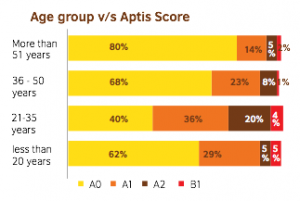Ninety-four per cent of Pakistan’s primary and middle school teachers lack the necessary English language skills needed for providing a quality education in English, due to what a report from the British Council’s Punjab Education and English Language Initiative (PEELI) calls a lack of “buy-in” to the government’s policy to expand and improve English medium education.
News and business analysis for Professionals in International Education
Have some pie!
Pakistan: 94% of teachers lack English skills
44% of teachers in the province were not using lesson plans
Of the 2,008 teachers sampled from Punjab’s 18 districts, 62% of private and 56% of government school teachers scored in the lowest possible band in the Aptis test – a computer based competency test used by the British Council– indicating an inability to use familiar everyday expressions and simple phrases.

English competency and age of teachers. Yellow indicates a basic user, Orange indicates an independent user and Maroon indicates a proficient user
“We are committed to continuing to work with the School Education Department of the Government of Punjab to improve the situation for both teachers and learners and ensure that English medium education is of the highest possible quality,” said Richard Wyers, Director Punjab at the British Council.
Overall, 24% of teachers aged 21 to 35 had a better grasp of the English language than their older colleagues – only 7% of those aged 51 scored comparative scores in the Aptis test. Of the 21 to 35-year olds surveyed, 30% agreed with English being the main medium of teaching while only 13% of teachers aged 51 and over believed the same.
Even though English is the state’s public schools’ medium of teaching for maths, less than 15% of teachers in both government and private schools teach using only English. Subjects where teachers used English most of the time include science, computer studies and English.
Pakistan’s education reform began four years ago and 75% of Pakistan’s 18 to 29 year-olds believe that education has improved.
Despite the perceived improvements, there is still a long way to go, 44% of teachers in the province were not using lesson plans, while 20% did not check their student’s understanding of the lesson with follow up questions.
Demand for an English medium is high enough that 40% of enrolment in primary and middle schools can be attributed to private schools who market their English curriculum to parents.
PEELI aims to work with the School Education Department of the Government of Punjab in Pakistan, to improve the language proficiency of 300,000 primary and middle school teachers.
Demand for an English medium is high enough that 40% of enrolment in primary and middle schools can be attributed to private schools who market their English curriculum
The report’s recommendations – targeting policy makers, the directorate of staff development and teachers – included introducing certificates as well as monetary and non-monetary awards to incentivise teachers to improve English language skills, updating curricula and testing teachers’ language proficiency.
Neighboring India, where hourly wages for those who speak fluent English is 34% higher than those who do not and simply attending an English medium school can boost income by 25%, largely inspires the emphasis on English in Punjab.
Within Pakistan itself, companies tended to promote their staff with proficient English skills quicker and pay them 30% more than their non English speaking counterparts.
“This research is invaluable in providing a solid foundation for taking this forward and we will continue to do our best to empower and enable teachers across Pakistan to deploy English language skills in the classroom using the latest teaching techniques,” Wyers added.
Still looking? Find by category:


